Reflection on Project Failure using Gibbs Reflective Cycle Analysis
VerifiedAdded on 2020/12/10
|5
|952
|302
Homework Assignment
AI Summary
This assignment presents a reflective analysis of a project failure, utilizing the Gibbs Reflective Cycle as a framework. The student identifies shortcomings in grammar, relevance, and critical evaluation, which led to not meeting the project criteria. The essay details feelings of discouragement and the recognition of areas for improvement in academic writing. The analysis section emphasizes the importance of developing specific skills, such as grammar proficiency and critical evaluation. An action plan is proposed, including training sessions for grammar, attending conferences for critical evaluation skills, and conducting effective research to improve relevance. The conclusion highlights the value of reflection in enhancing personal and professional skills, emphasizing the importance of continuous improvement. The assignment includes references to relevant literature supporting the analysis and proposed strategies.
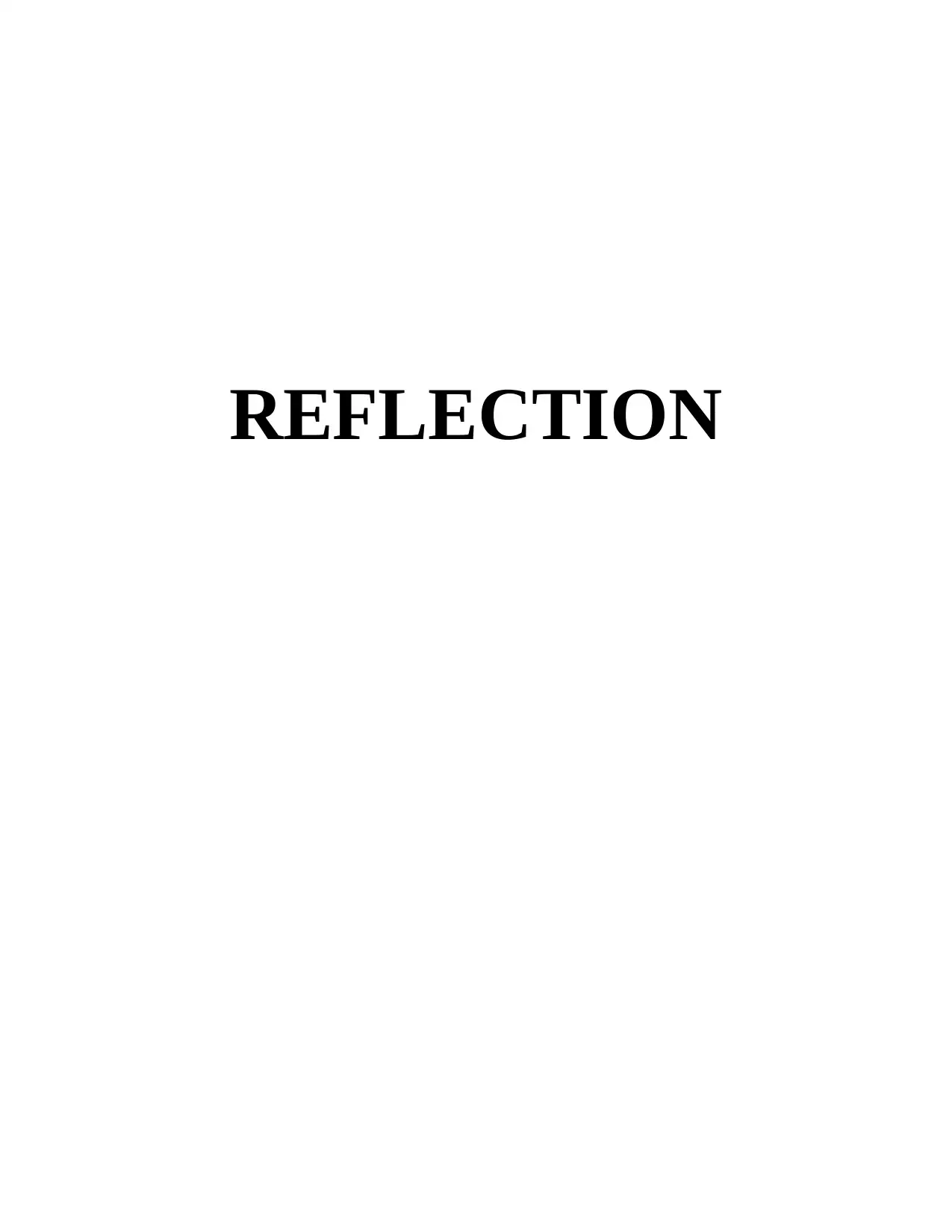
REFLECTION
Paraphrase This Document
Need a fresh take? Get an instant paraphrase of this document with our AI Paraphraser
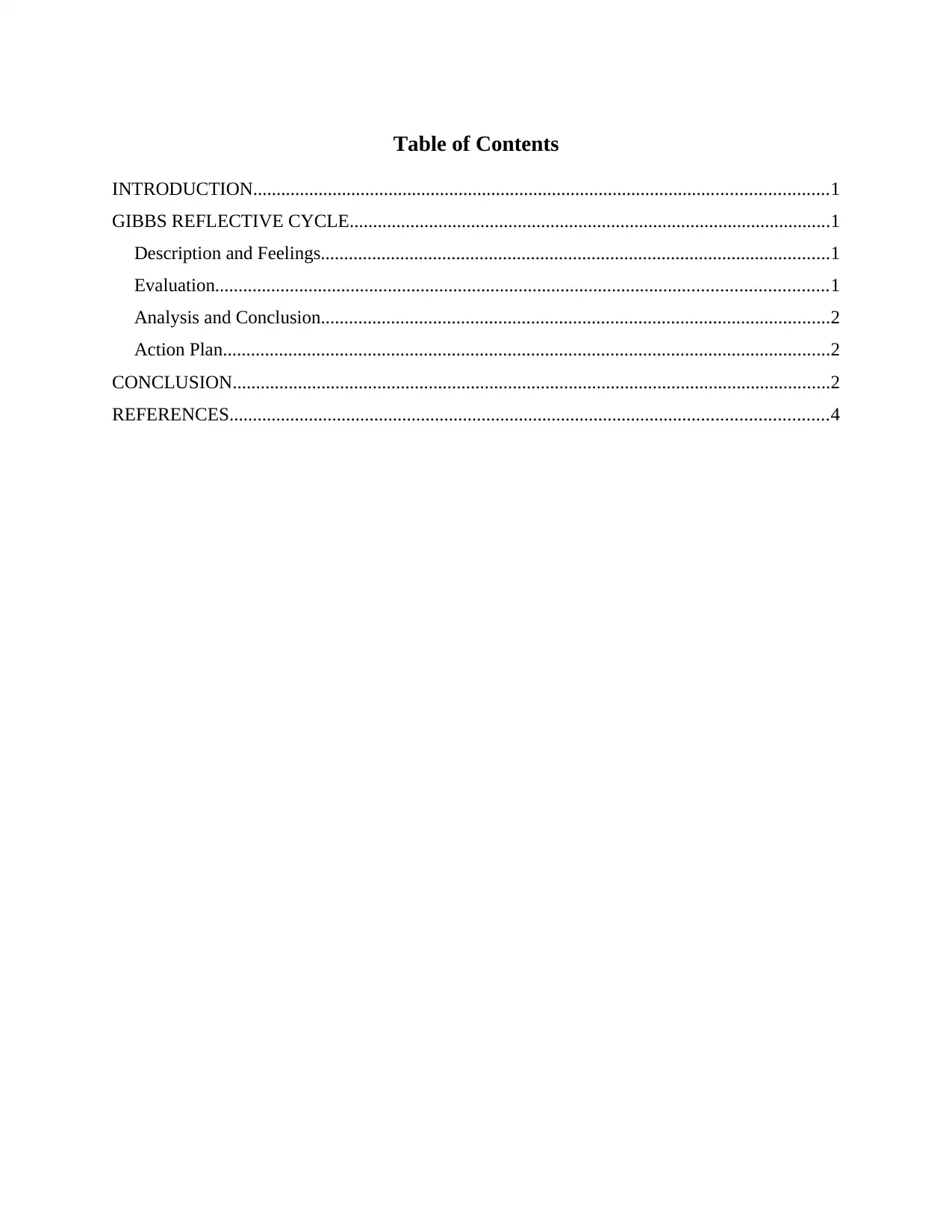
Table of Contents
INTRODUCTION...........................................................................................................................1
GIBBS REFLECTIVE CYCLE.......................................................................................................1
Description and Feelings.............................................................................................................1
Evaluation...................................................................................................................................1
Analysis and Conclusion.............................................................................................................2
Action Plan..................................................................................................................................2
CONCLUSION................................................................................................................................2
REFERENCES................................................................................................................................4
INTRODUCTION...........................................................................................................................1
GIBBS REFLECTIVE CYCLE.......................................................................................................1
Description and Feelings.............................................................................................................1
Evaluation...................................................................................................................................1
Analysis and Conclusion.............................................................................................................2
Action Plan..................................................................................................................................2
CONCLUSION................................................................................................................................2
REFERENCES................................................................................................................................4
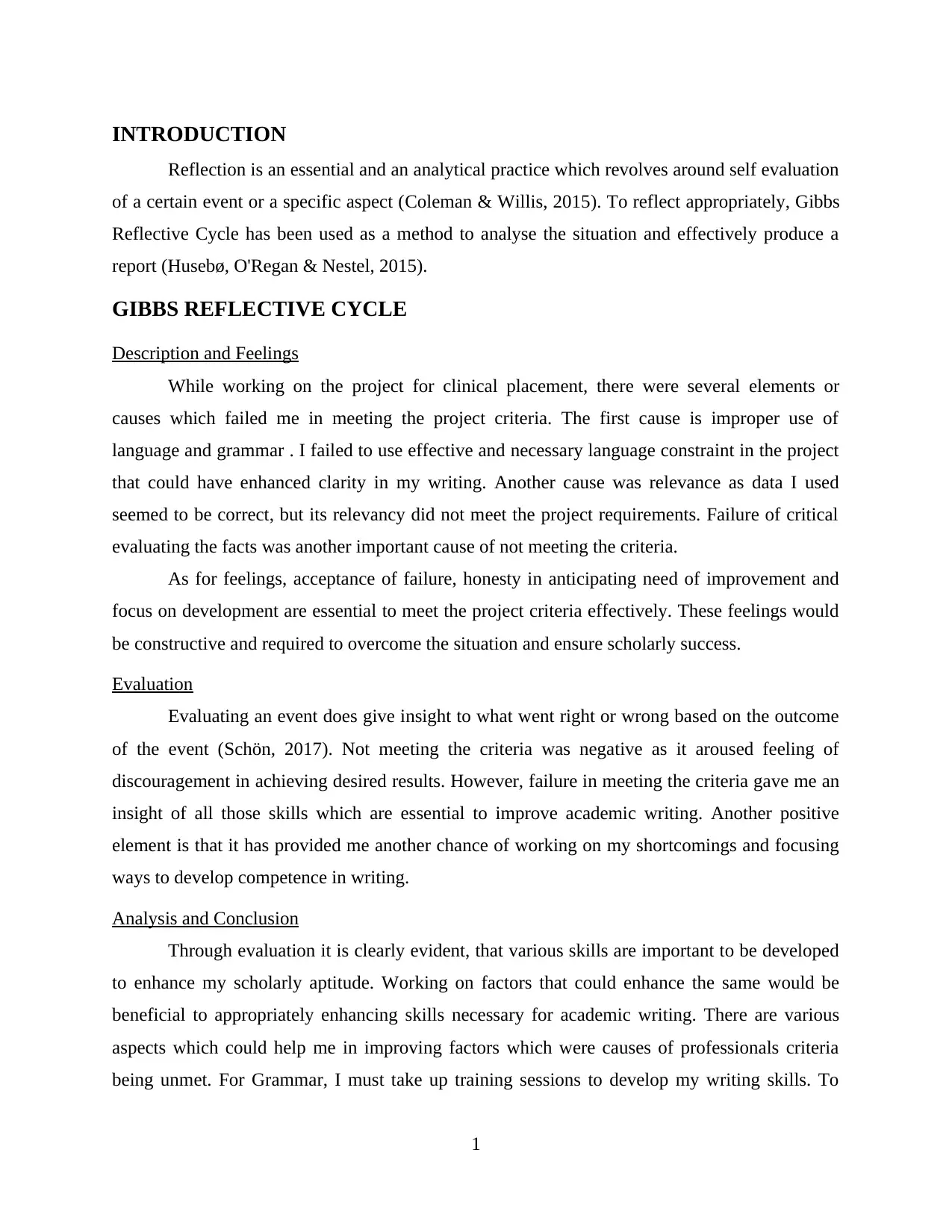
INTRODUCTION
Reflection is an essential and an analytical practice which revolves around self evaluation
of a certain event or a specific aspect (Coleman & Willis, 2015). To reflect appropriately, Gibbs
Reflective Cycle has been used as a method to analyse the situation and effectively produce a
report (Husebø, O'Regan & Nestel, 2015).
GIBBS REFLECTIVE CYCLE
Description and Feelings
While working on the project for clinical placement, there were several elements or
causes which failed me in meeting the project criteria. The first cause is improper use of
language and grammar . I failed to use effective and necessary language constraint in the project
that could have enhanced clarity in my writing. Another cause was relevance as data I used
seemed to be correct, but its relevancy did not meet the project requirements. Failure of critical
evaluating the facts was another important cause of not meeting the criteria.
As for feelings, acceptance of failure, honesty in anticipating need of improvement and
focus on development are essential to meet the project criteria effectively. These feelings would
be constructive and required to overcome the situation and ensure scholarly success.
Evaluation
Evaluating an event does give insight to what went right or wrong based on the outcome
of the event (Schön, 2017). Not meeting the criteria was negative as it aroused feeling of
discouragement in achieving desired results. However, failure in meeting the criteria gave me an
insight of all those skills which are essential to improve academic writing. Another positive
element is that it has provided me another chance of working on my shortcomings and focusing
ways to develop competence in writing.
Analysis and Conclusion
Through evaluation it is clearly evident, that various skills are important to be developed
to enhance my scholarly aptitude. Working on factors that could enhance the same would be
beneficial to appropriately enhancing skills necessary for academic writing. There are various
aspects which could help me in improving factors which were causes of professionals criteria
being unmet. For Grammar, I must take up training sessions to develop my writing skills. To
1
Reflection is an essential and an analytical practice which revolves around self evaluation
of a certain event or a specific aspect (Coleman & Willis, 2015). To reflect appropriately, Gibbs
Reflective Cycle has been used as a method to analyse the situation and effectively produce a
report (Husebø, O'Regan & Nestel, 2015).
GIBBS REFLECTIVE CYCLE
Description and Feelings
While working on the project for clinical placement, there were several elements or
causes which failed me in meeting the project criteria. The first cause is improper use of
language and grammar . I failed to use effective and necessary language constraint in the project
that could have enhanced clarity in my writing. Another cause was relevance as data I used
seemed to be correct, but its relevancy did not meet the project requirements. Failure of critical
evaluating the facts was another important cause of not meeting the criteria.
As for feelings, acceptance of failure, honesty in anticipating need of improvement and
focus on development are essential to meet the project criteria effectively. These feelings would
be constructive and required to overcome the situation and ensure scholarly success.
Evaluation
Evaluating an event does give insight to what went right or wrong based on the outcome
of the event (Schön, 2017). Not meeting the criteria was negative as it aroused feeling of
discouragement in achieving desired results. However, failure in meeting the criteria gave me an
insight of all those skills which are essential to improve academic writing. Another positive
element is that it has provided me another chance of working on my shortcomings and focusing
ways to develop competence in writing.
Analysis and Conclusion
Through evaluation it is clearly evident, that various skills are important to be developed
to enhance my scholarly aptitude. Working on factors that could enhance the same would be
beneficial to appropriately enhancing skills necessary for academic writing. There are various
aspects which could help me in improving factors which were causes of professionals criteria
being unmet. For Grammar, I must take up training sessions to develop my writing skills. To
1
⊘ This is a preview!⊘
Do you want full access?
Subscribe today to unlock all pages.

Trusted by 1+ million students worldwide
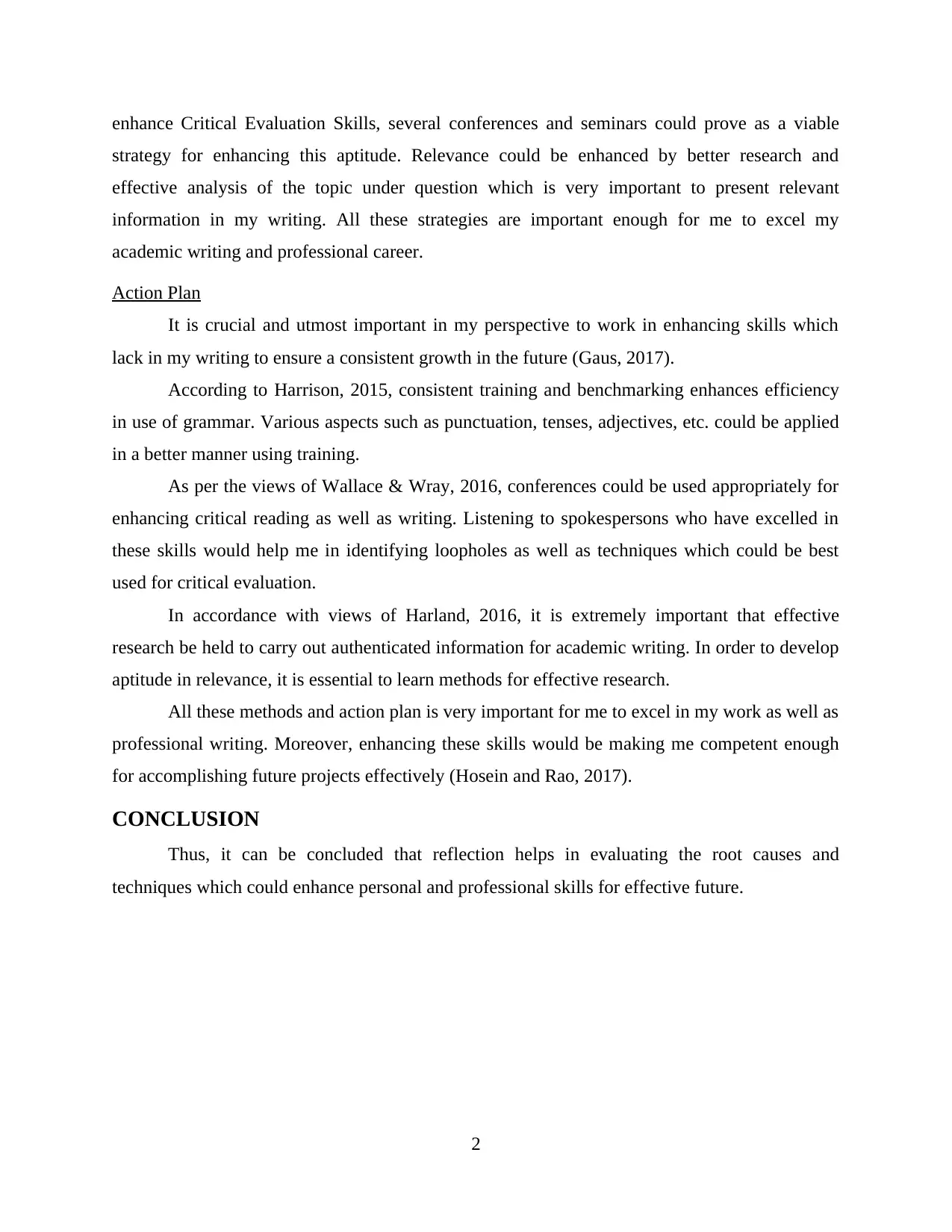
enhance Critical Evaluation Skills, several conferences and seminars could prove as a viable
strategy for enhancing this aptitude. Relevance could be enhanced by better research and
effective analysis of the topic under question which is very important to present relevant
information in my writing. All these strategies are important enough for me to excel my
academic writing and professional career.
Action Plan
It is crucial and utmost important in my perspective to work in enhancing skills which
lack in my writing to ensure a consistent growth in the future (Gaus, 2017).
According to Harrison, 2015, consistent training and benchmarking enhances efficiency
in use of grammar. Various aspects such as punctuation, tenses, adjectives, etc. could be applied
in a better manner using training.
As per the views of Wallace & Wray, 2016, conferences could be used appropriately for
enhancing critical reading as well as writing. Listening to spokespersons who have excelled in
these skills would help me in identifying loopholes as well as techniques which could be best
used for critical evaluation.
In accordance with views of Harland, 2016, it is extremely important that effective
research be held to carry out authenticated information for academic writing. In order to develop
aptitude in relevance, it is essential to learn methods for effective research.
All these methods and action plan is very important for me to excel in my work as well as
professional writing. Moreover, enhancing these skills would be making me competent enough
for accomplishing future projects effectively (Hosein and Rao, 2017).
CONCLUSION
Thus, it can be concluded that reflection helps in evaluating the root causes and
techniques which could enhance personal and professional skills for effective future.
2
strategy for enhancing this aptitude. Relevance could be enhanced by better research and
effective analysis of the topic under question which is very important to present relevant
information in my writing. All these strategies are important enough for me to excel my
academic writing and professional career.
Action Plan
It is crucial and utmost important in my perspective to work in enhancing skills which
lack in my writing to ensure a consistent growth in the future (Gaus, 2017).
According to Harrison, 2015, consistent training and benchmarking enhances efficiency
in use of grammar. Various aspects such as punctuation, tenses, adjectives, etc. could be applied
in a better manner using training.
As per the views of Wallace & Wray, 2016, conferences could be used appropriately for
enhancing critical reading as well as writing. Listening to spokespersons who have excelled in
these skills would help me in identifying loopholes as well as techniques which could be best
used for critical evaluation.
In accordance with views of Harland, 2016, it is extremely important that effective
research be held to carry out authenticated information for academic writing. In order to develop
aptitude in relevance, it is essential to learn methods for effective research.
All these methods and action plan is very important for me to excel in my work as well as
professional writing. Moreover, enhancing these skills would be making me competent enough
for accomplishing future projects effectively (Hosein and Rao, 2017).
CONCLUSION
Thus, it can be concluded that reflection helps in evaluating the root causes and
techniques which could enhance personal and professional skills for effective future.
2
Paraphrase This Document
Need a fresh take? Get an instant paraphrase of this document with our AI Paraphraser
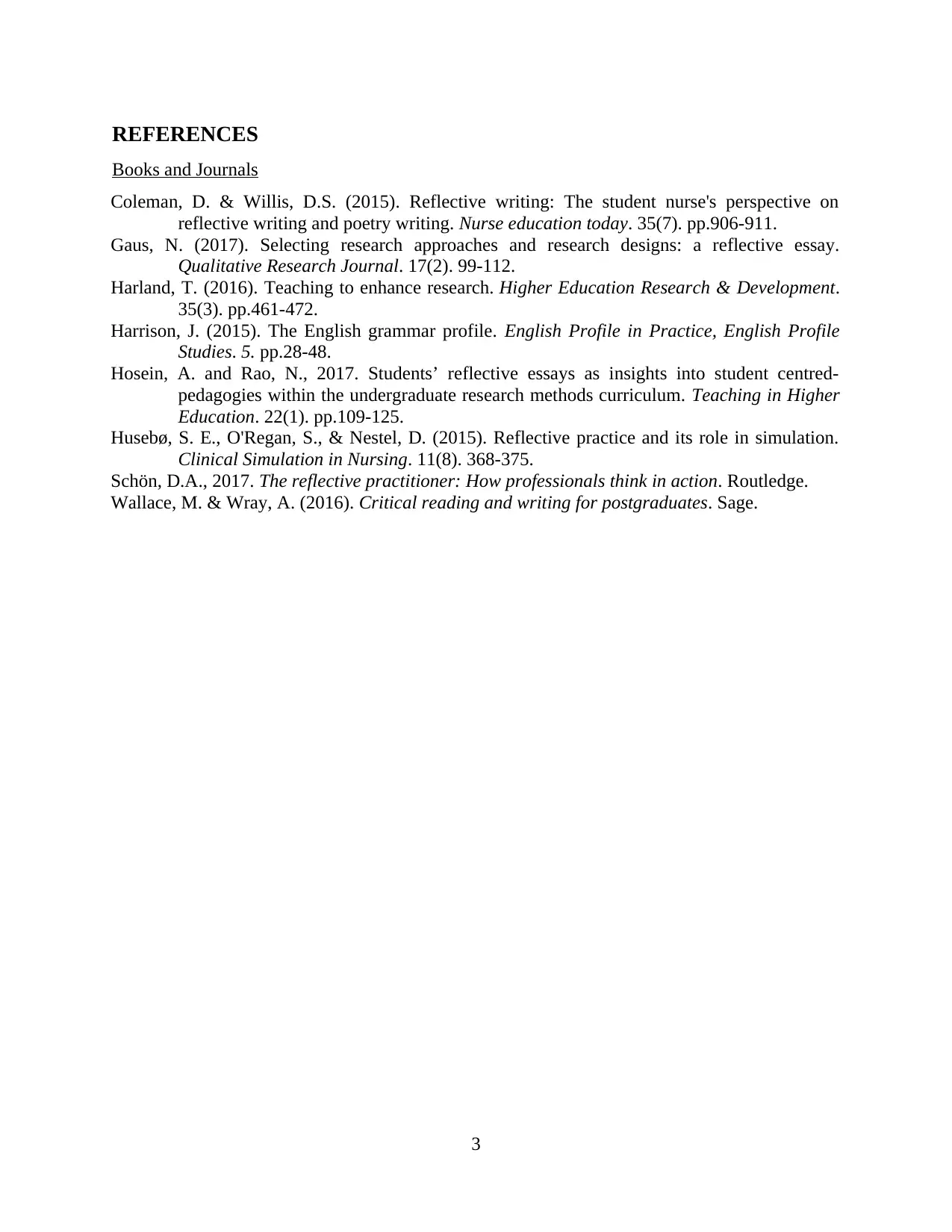
REFERENCES
Books and Journals
Coleman, D. & Willis, D.S. (2015). Reflective writing: The student nurse's perspective on
reflective writing and poetry writing. Nurse education today. 35(7). pp.906-911.
Gaus, N. (2017). Selecting research approaches and research designs: a reflective essay.
Qualitative Research Journal. 17(2). 99-112.
Harland, T. (2016). Teaching to enhance research. Higher Education Research & Development.
35(3). pp.461-472.
Harrison, J. (2015). The English grammar profile. English Profile in Practice, English Profile
Studies. 5. pp.28-48.
Hosein, A. and Rao, N., 2017. Students’ reflective essays as insights into student centred-
pedagogies within the undergraduate research methods curriculum. Teaching in Higher
Education. 22(1). pp.109-125.
Husebø, S. E., O'Regan, S., & Nestel, D. (2015). Reflective practice and its role in simulation.
Clinical Simulation in Nursing. 11(8). 368-375.
Schön, D.A., 2017. The reflective practitioner: How professionals think in action. Routledge.
Wallace, M. & Wray, A. (2016). Critical reading and writing for postgraduates. Sage.
3
Books and Journals
Coleman, D. & Willis, D.S. (2015). Reflective writing: The student nurse's perspective on
reflective writing and poetry writing. Nurse education today. 35(7). pp.906-911.
Gaus, N. (2017). Selecting research approaches and research designs: a reflective essay.
Qualitative Research Journal. 17(2). 99-112.
Harland, T. (2016). Teaching to enhance research. Higher Education Research & Development.
35(3). pp.461-472.
Harrison, J. (2015). The English grammar profile. English Profile in Practice, English Profile
Studies. 5. pp.28-48.
Hosein, A. and Rao, N., 2017. Students’ reflective essays as insights into student centred-
pedagogies within the undergraduate research methods curriculum. Teaching in Higher
Education. 22(1). pp.109-125.
Husebø, S. E., O'Regan, S., & Nestel, D. (2015). Reflective practice and its role in simulation.
Clinical Simulation in Nursing. 11(8). 368-375.
Schön, D.A., 2017. The reflective practitioner: How professionals think in action. Routledge.
Wallace, M. & Wray, A. (2016). Critical reading and writing for postgraduates. Sage.
3
1 out of 5
Related Documents
Your All-in-One AI-Powered Toolkit for Academic Success.
+13062052269
info@desklib.com
Available 24*7 on WhatsApp / Email
![[object Object]](/_next/static/media/star-bottom.7253800d.svg)
Unlock your academic potential
Copyright © 2020–2026 A2Z Services. All Rights Reserved. Developed and managed by ZUCOL.




